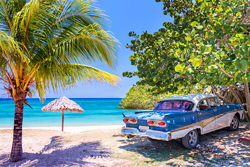
For many U.S. citizens, Cuba is an intriguing, even mysterious, place. For more than 50 years -- from 1961-2015 -- the two countries had no diplomatic relationship, despite the fact that the island country is less than 90 miles off the coast of Florida.
Since 1994, however, the Association of Cuban Educators has hosted Búsquedas Investigativas, an educational exchange for U.S. and Cuban higher education practitioners to help shed light on contemporary issues in education. Hundreds of U.S. and international education professionals and students have participated since the founding of the exchange.
Beginning in 2018, AACRAO members will have the opportunity to do first-hand research and exploration of Cuba’s educational system through this exchange, thanks to a partnership with graduate researchers from the University of Maryland and George Washington University.
The program
“Every year, we spend 8 days in-country, where we get to connect with Cuban educators studying, interested in, and practicing the same educational techniques we’re doing,” said Taylor Woodman, co-director of the program. “We meet with higher education presidents, faculty, and policymakers to learn more about the educational system in Cuba.”
The exchange always includes a few days in Havana, Cuba’s capital city, and a complementary few days in another province, which location rotates each year, for comparison. The 2018 exchange will be going to Havana and Matanzas, Feb. 17-25, 2018.
“That’s a perfect time to go,” Woodman says. “School sessions are in full swing and the weather is beautiful in February.”
About 40 educators are typically in the group, and applicants are then put into smaller groups with participants who have similar research interests. Woodman encourages applicants even if their research interest is broad, because the program directors can help refine your specific area of interest. Spanish skills are not required, as translators travel with the group.
The itinerary consists of the following:
-
Visits to schools, research centers, and institutions of higher education
-
Individual and group interviews with Cuban educators and students
-
Lectures by educational officials and scholars
-
Question-and-Answer sessions
-
Collaborative Workshops on methods and methodologies
-
Opportunities for library research
“With the embargo that prevented Americans from going to Cuba since the 1960s, this exchange allows for a dialogue where a dialogue couldn’t happen before,” Woodman said. “It allows educators to sit down and have a real discussion. And since it’s a long-standing exchange, participants have access to those relationships and people are quite excited to engage -- you can have in-depth conversations about educational processes.”
AACRAO invites members to apply to join us in Cuba for an intensive week of research on the Cuban educational system, policies, and practices at all levels, from day care to university and postgraduate education.
Visit AACRAO’s The Cuba Project website for the complete itinerary and details on how to apply.
____________________________________________________________________
Join AACRAO International's Fall Symposium, The U.S. perspective on the Three-Year Bologna-Compliant Bachelor Degree, Sept. 18th in Washington, DC.